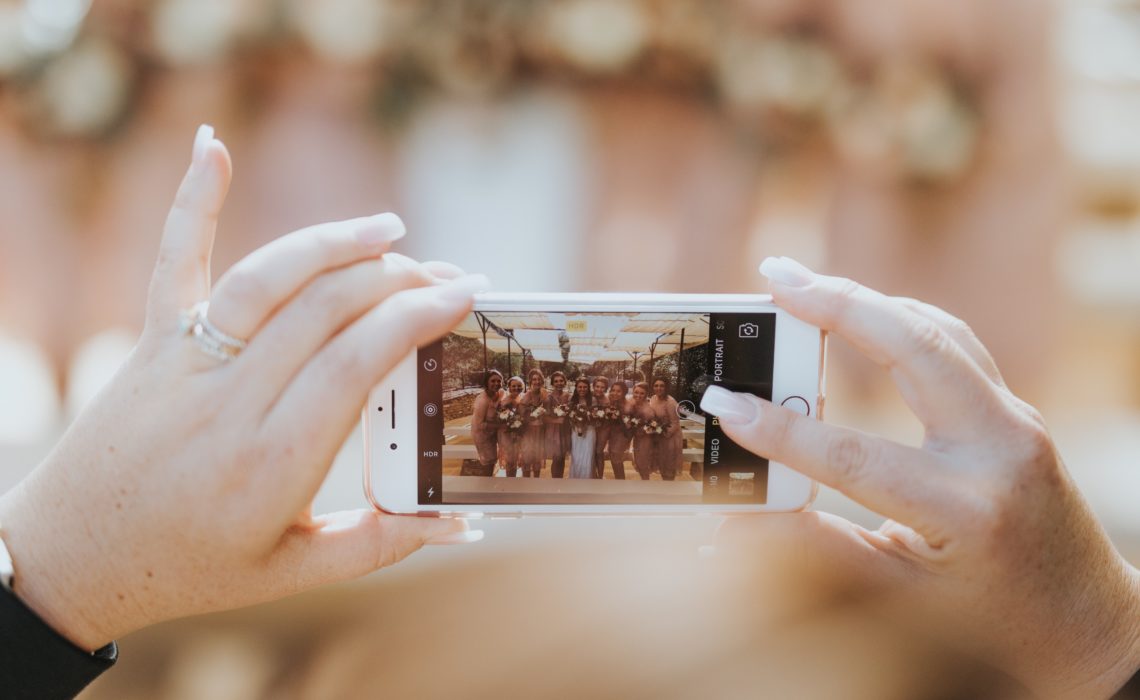
In a world where more than 2.5 billion people have smartphones, the hand-held devices are everywhere. Chances are, yours is within arm’s reach right now. You might even be using it to read this post! Of course, there’s nothing wrong with using a cellphone. But if you want to share your wedding day with friends and family—and not their devices—hosting an unplugged wedding might be the right choice for you.
Unplugged weddings encourage guests to silence their phones and refrain from taking any photos. Most commonly, the unplugged rule applies only to the ceremony, and not the reception. That way, everyone is sharing the important moment together, instead of focusing on the perfect shot. (After all, that’s what you have a photographer for!) It also prevents unflattering photos from making their way online, or anyone’s view being blocked by a raised cellphone.
Many of your guests will know better than to take a call or text mid-ceremony. But a no-pictures rule is still a little out of the norm. So you’ll want to follow these do’s and dont’s so your guests are prepared, and your wedding vision isn’t ruined.
DO:
Clearly communicate with your guests

In some instances, “unplugged” means “leaving your device at home.” Make sure your guests know that their phones are welcome—but their noises and pictures during the ceremony are not! Include a note on your wedding website with the information, and make sure to have a sign or two at the ceremony, so guests have a day-of reminder.
You can also ask the wedding party to spread the word ahead of time to invited friends and family. Then, have your officiant make an announcement once everyone is seated, before the actual ceremony begins. Grabbing your phone for a photo is second nature—so extra reminders can’t hurt!
DON’T:
Put it in the invitations
Your wedding invitations are for the most important details. This includes the wedding time, date, and location, along with RSVP cards and meal preferences. You don’t have to cover every little detail—that’s what your wedding website is for! While you may feel strongly about your unplugged wedding, you don’t have to make a big splash about it. A few clear announcements and reminders will get the message across, without making your whole ceremony about cellphones.
DO:
Offer take-home photos

Your guests want to remember the celebration, too. That’s why they’re taking photos! And while you might share the professional shots with them, the photographers are focused on you and your partner. Your friends and family won’t be in every photo—which is why an unplugged wedding typically applies just to the ceremony. But if your reception is phone-free, too, consider a photo booth. That way, guests get their own photos from the happy day—without any digital copies or hand-held distractions.
DON’T:
Create a wedding hashtag
Wedding hashtags are on the opposite end of the phones-at-wedding spectrum. Instead of tucking phones away, guests are encouraged to share their photos online using unique hashtags for easy finding later on. That way, brides and grooms can collect behind-the-scenes action that photographers might miss. But if you want an unplugged wedding, don’t create a hashtag. That will send mixed messages—even if you allow pictures during the reception. Guests will be confused, and you’ll spend too much time explaining the distinction. Whatever your phone policy is, stick to it!
DO:
Prepare to wait

Of course, the benefit of a wedding hashtag is scrolling through photos immediately. Whether you’re en route to your honeymoon, or just lounging at home in martial bliss, you can remember the night before with all your friends photos. If you choose an unplugged wedding, however, you’ll have to wait a few weeks for the photographer to send proofs. If you’re an impatient bride or groom, an unplugged wedding might not be for you.
DON’T:
Forget that this is your day
Your unplugged wedding is about being present in the moment and letting your professional (and probably not cheap!) photographer do their job. It’s not about restricting guests, or creating odd rules for your wedding. If you’re worried that certain guests will be upset, consider telling them in person. Or explain your reasoning on your wedding website. And if you need some outside help, take a peek at how this wedding photo was ruined by a cellphone, or how this groom struggled to see his bride.
CONCLUSION:
There are a few extra details to plan for an unplugged wedding. But it’s a small price to pay for uninterrupted moments with friends and family. If any part of your wedding is device-free, let your photographer know ahead of time. That way, they can take more guest photos (and line up for the perfect shot of you and your spouse!)
Have you ever been to an unplugged wedding? Do you think it’s a good or bad idea?


